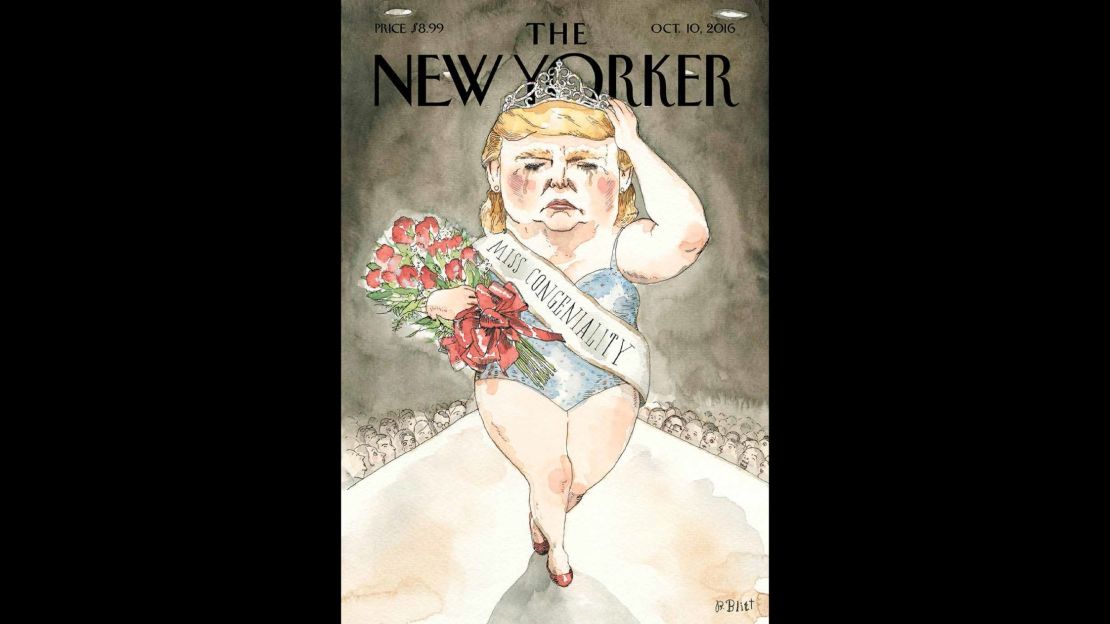Editor’s Note: Lindsey Averill, a PhD candidate in comparative studies at Florida Atlantic University, is co-creator of Fattitude the movie,and regularly writes for media outlets such as Time.com, xojane, The Huffington Post, Alternet and Bustle. Follow her on Twitter. The opinions expressed in this commentary are solely those of the author.
Story highlights
Lindsey Averill: Donald Trump is a fat-shamer, and that is puzzling because he's a fat man; I say this not derisively, but as a fact
She says fat shaming has real and negative impact on lives, is linked to job and social discrimination, depression, suicide
If you’re new to the body-positive conversation, fat-shaming might feel like a buzz word – but it’s a real thing, and it has very real consequences. Fat people experience systemic prejudice that is on par with racism and sexism – and by that I mean that statistical data documents that fat people are confronted with oppressive bias in economic, educational, medical, and social spaces.

Beyond this, hatred of fat people like that expressed by Donald Trump is markedly understood by psychologists as contributing to low self-esteem, anxiety, depression and suicidal behavior in young people.
In his career as a public figure, Trump has openly fat-shamed a number of women including Rosie O’Donnell, Kim Kardashian, Jennifer Lopez, and former Miss Universe, Alicia Machado (most recently, twice in 24 hours). And, at the recent presidential debate, he conjured a visual on how cyber threats to national security might well be conducted by “somebody sitting on their bed that weighs 400 pounds,” a comment that, to say the least, reinforces negative ideas about fat people and their trustworthiness.
Most of us already know that in general, Trump deals in insults and degradation. Demeaning fat people, representing them as “less than,” is one of the terrible tools in his arsenal.
That said, unlike all the other verbal violence that Trump deploys, there is something really weird about his distaste for us larger-bodied folk: his failure to realize that he’s a fat man.
DONALD TRUMP IS A FAT MAN.
To be clear, when I call Trump fat I mean him no insult – because as far as I am concerned fat is a neutral descriptor, a term that deals only in simple facts—akin to noting I have brown eyes and brown hair. Assuming fatness as bad is a byproduct of a culture that already is on board with Trump’s thinking, positioning some – in this case thin people - as deserving of respect, and positioning others as unworthy of kindness, care and equal treatment.
Celebs who have been body-shamed
You would think that Trump, as a person of increased girth, might get it that representing people with fat bodies as slovenly, unmotivated, disgusting, unruly and amoral is a product of bias, but in this case no such luck. Trump’s failure to realize that demeaning fatness is an insult to himself may be part of his much larger issue of personal denial and an inability to differentiate between truth and self-serving falsifications.
Obviously, I am not a Trump supporter. I’m a believer in pursuing social justice for all people. Human dignity and human success require a life and a politics that favor individual generosity and national prosperity over personal greed. As far as I can tell, the Trump team doesn’t value the many over the few. Trump is divisive; he motivates loyalty with fear and encourages hatred. I find him to be unfit for office.
And yet, a month or so ago when life-sized naked Trump replicas were turning up around the country and people were jesting about the fatness of this man who, terrifyingly, wants to be president - I didn’t laugh. It doesn’t matter if I detest everything that Trump stands for, we cannot allow ourselves to slip into the trap of brandishing his fatness as a symbol of his hatefulness.

A recent cover of The New Yorker parodied Trump by presenting him as Miss Congeniality. The image presents Trump as a failed fat beauty queen, teary-eyed in heels and a swimsuit; it is already the veritable ‘talk of the town’ because it is calling attention to his hypocrisy. In this moment, it’s important to remember that beneath this joke at Trump’s expense are sexist and fat-shaming ideas.
To shame and pigeon-hole anyone based on appearance is wrong. Perhaps you remember this – it was something we all learned in kindergarten or maybe even earlier. Then, we proceeded to carve out lives in a world that perpetuates body-policing of all kinds and lost sight of the fact that mean-spirited comments have repercussions.
Shift the script. Step away from oversimplified stereotypes that make negative assumptions about fatness and fat people.
Get our free weekly newsletter
Trump shows disrespect towards people of all kinds. Give him a microphone and within minutes something racist, sexist, homophobic or xenophobic is bound to spill forth. So, his complete disregard for the consequences of treating fat people with demeaning brutality is no surprise.
What IS a surprise? That so many Americans believe that this bully, badly in need of a serious dose of moral guidance, should be president – that’s flabbergasting.
So, no, don’t fat-shame Trump. We are better than that.


































